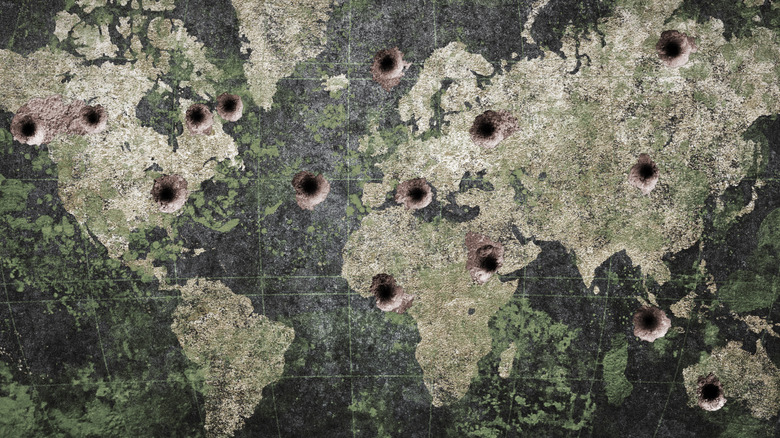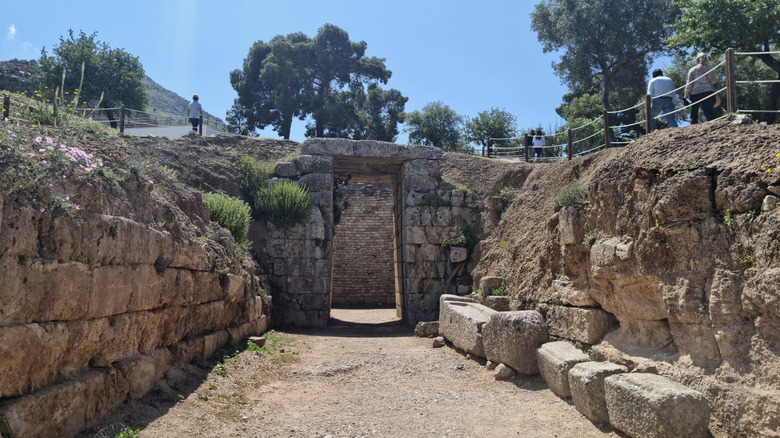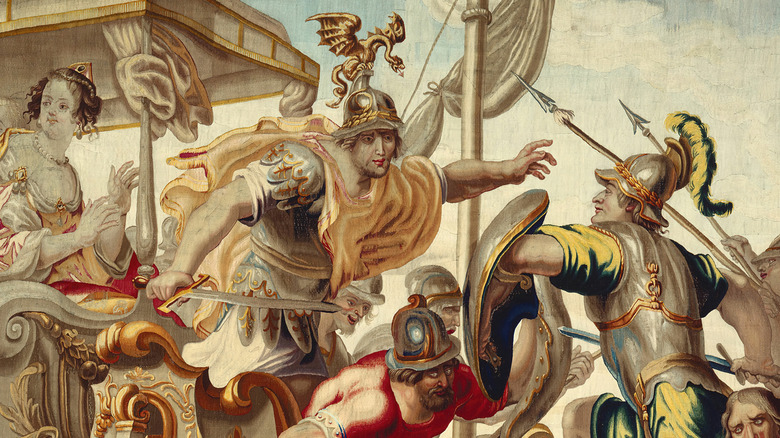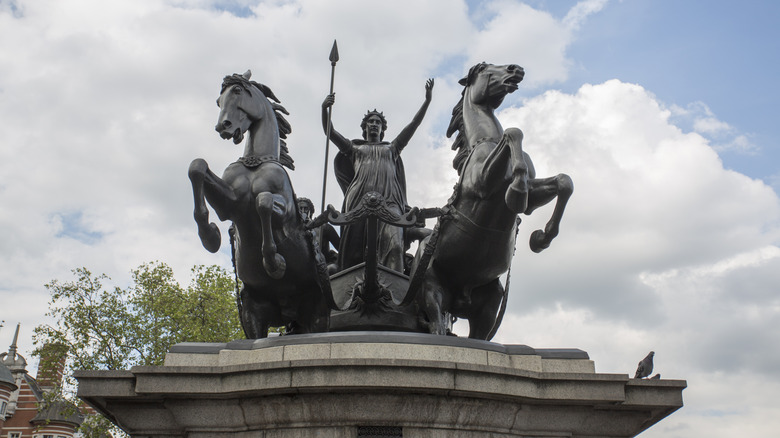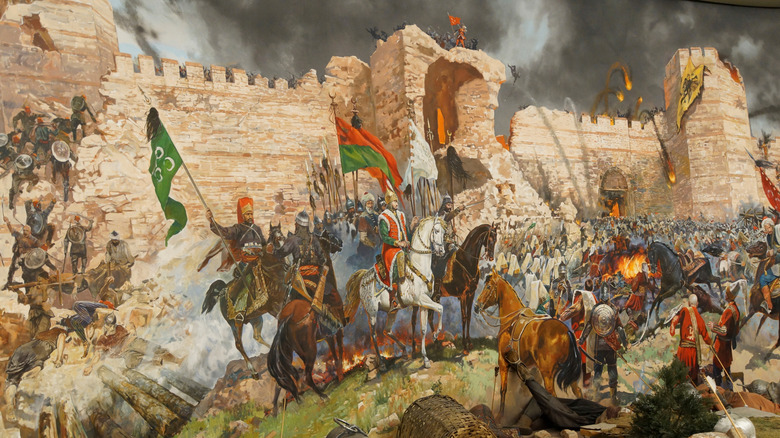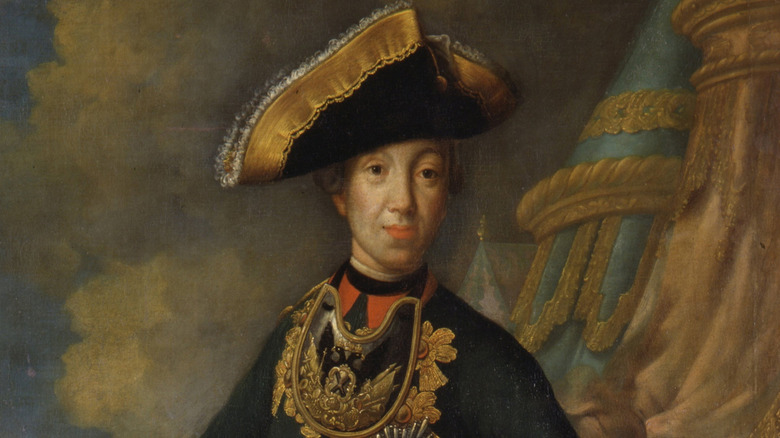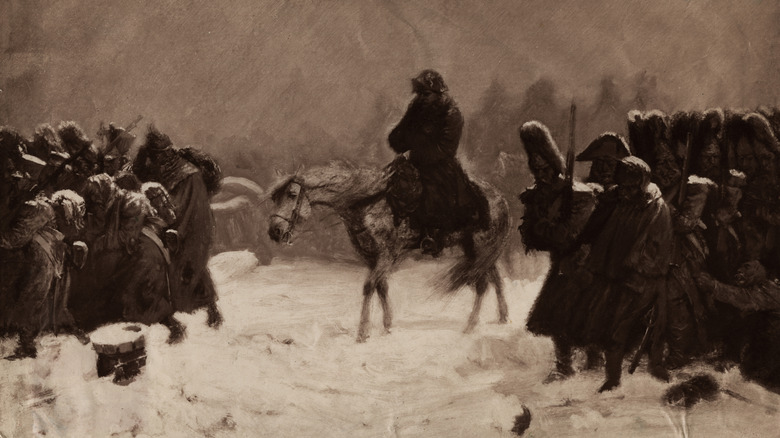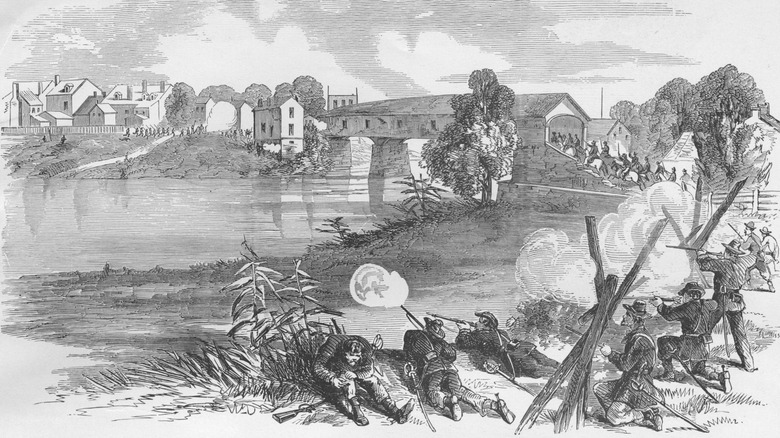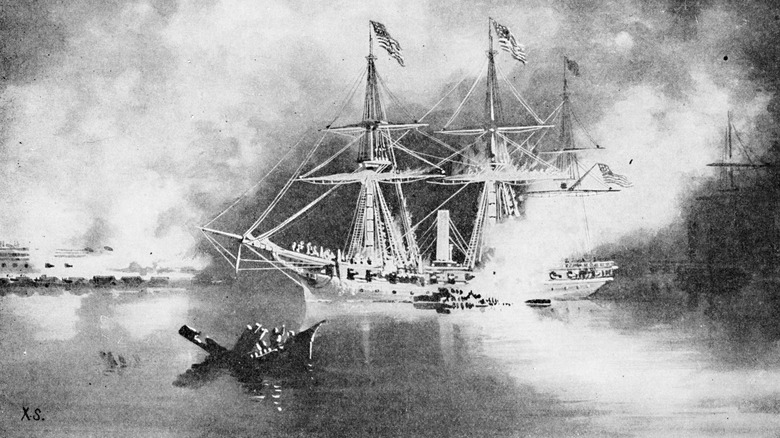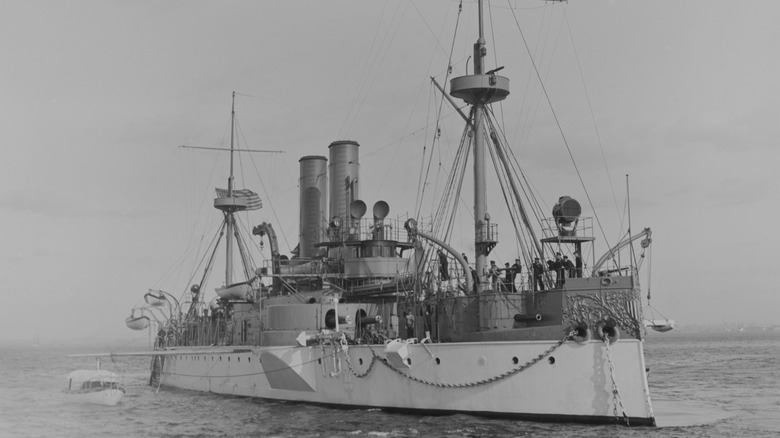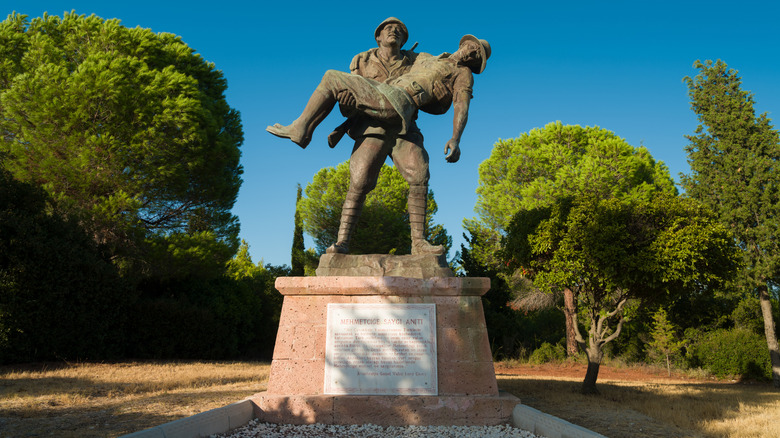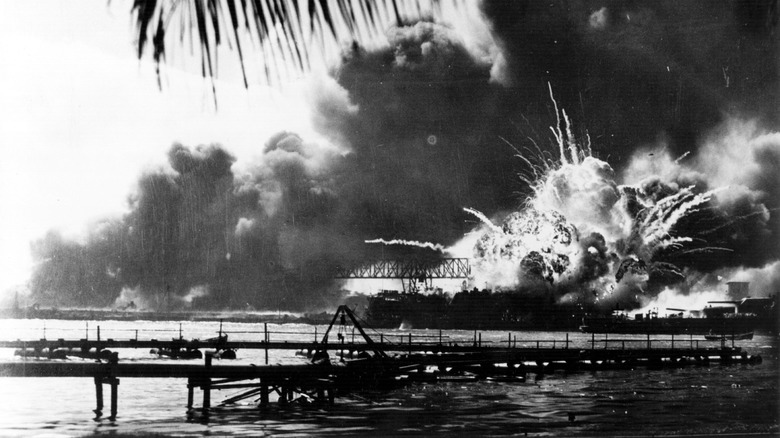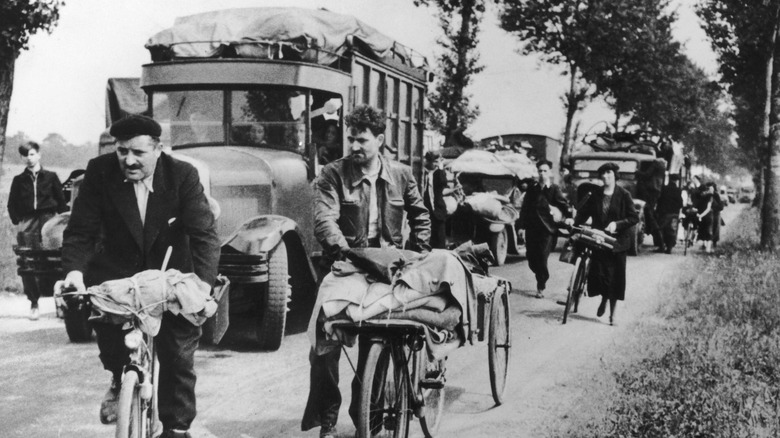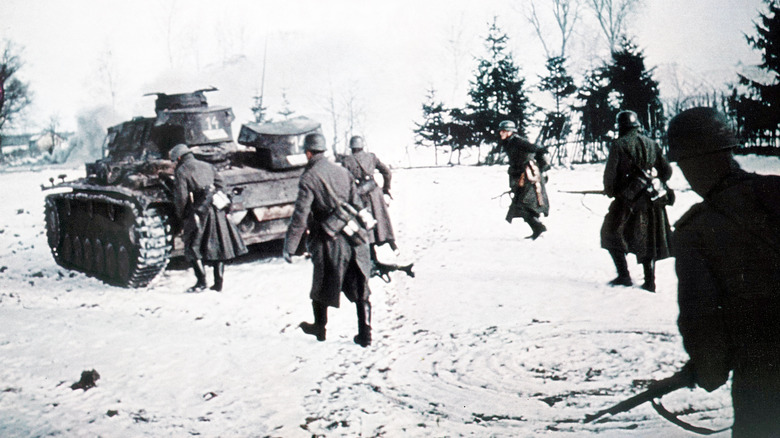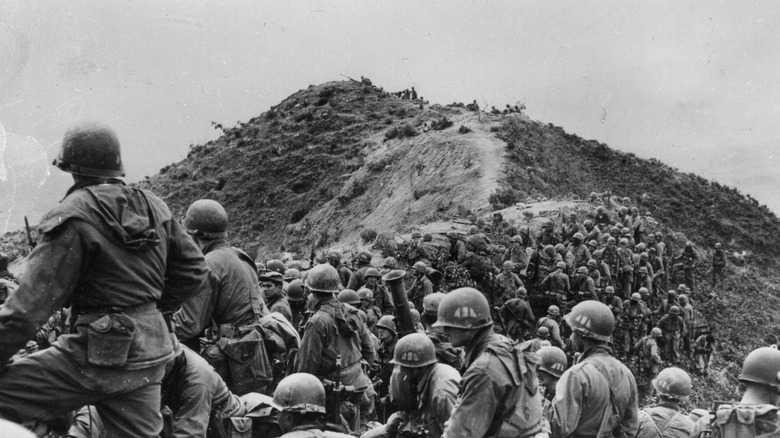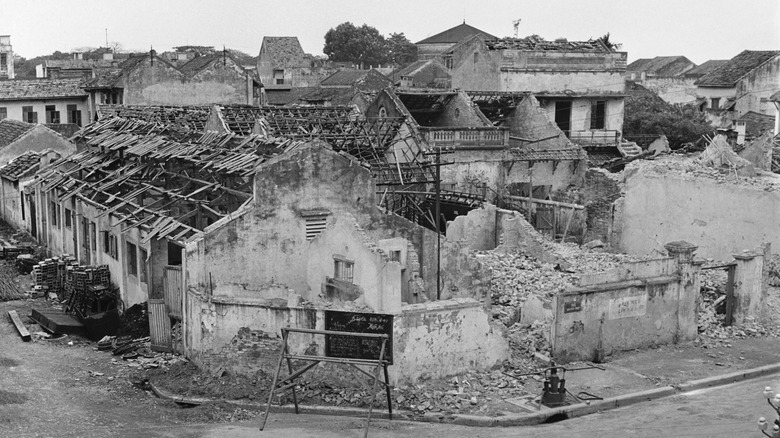Things About These Infamous Wars That Don't Make Sense
Unfortunately, war seems to be one of the most basic human activities. Archaeologists have found defensive weapons that may be 6,000 years old, and the oldest written account of a war is from roughly 2700 B.C., when Sumer defeated and conquered Elam. Even our cousins the chimpanzees seem to suffer from organized bloodlust: Famed zoologist Jane Goodall was shocked to record a four-year war between two rival groups of chimps, which was apparently an attempt at territorial conquest.
The famous aphorism tells us that history is written by the victors, and this is generally true: For example, we don't have an Elamite perspective on that first recorded war. These often one-sided reports, along with the chaotic and sometimes secretive nature of war, mean that even some of the most notable conflicts in world history have aspects that don't make sense. Unless and until new records or sources emerge, some aspects of humankind's most terrible wars will never be fully explained.
We still don't know who the Sea Peoples were
The Bronze Age of the ancient world ended in a sudden collapse in the decades around 1177 B.C., with cities destroyed, polities disintegrating, and trade networks severed. While potential causes for the collapse have been debated among scholars, most conclude that among the key causes were the invasions of the Sea Peoples, waterborne warriors who arrived with their wives and children, emphasizing their intention to conquer and remain. Unfortunately, we're not totally sure just who these Sea Peoples were.
Egyptian sources name the groups of invaders that ravaged the eastern Mediterranean and invaded Egypt itself as the Sherden, Sheklesh, Lukka, Tursha, and Akawasha. These names have allowed some loose identification with known Mediterranean groups, but the limited detail in the Egyptian records and the ambiguity of the few details mean no identification can be locked down to the satisfaction of scholarly consensus.
The Egyptian accounts largely describe pharaoh Ramses II's victories over the Sea Peoples, who were allied with his Libyan rivals, and so they're more concerned with making the pharaoh look good than providing helpful ethnological detail about those he defeated. After a couple of wallopings at the hands of Ramses's forces, the Sea People vanish from the records — perhaps eradicated in part by the natural disasters, political instability, and climate change that made their victories over the Canaanites, Hittites, and others possible.
Why did Cleopatra flee the Battle of Actium?
The Battle of Actium was well and truly for all the marbles. Octavian, aka Augustus Caesar before his rebrand, faced Mark Antony and Cleopatra: The winner would control the Mediterranean world. The two fleets clashed near the western shore of Greece, and the more maneuverable ships in Octavian's navy outfought Mark Antony's heavy quinqueremes. According to the common myth of the battle, a factor in Antony's loss was Cleopatra's retreat. Her nerve broke, and she took her ships back toward Egypt as fast as their crews could row them.
Doesn't really sound like Cleopatra, does it? One of the most famous women in human history, Cleopatra is remembered in part because of her boldness, playing politics as well as the men while struggling to keep Egypt from becoming a mere Roman province. She'd even been at war before, defeating her brother-husband's attempt to invade Egypt and dethrone her. So why would an older, more mature Cleopatra desert a man she loved, who was also an ally she desperately needed?
Some historians now argue that the traditional story is backward. The battle wasn't lost because Cleopatra fled, but she fled because they'd lost. If Cleopatra could get the treasure she had with her, some warships, and herself back to Egypt, there was a chance she could keep her kingdom afloat long enough to keep fighting. It didn't work, with Octavian's forces taking Egypt soon after Actium, and Cleopatra and Antony both dying by suicide rather than face captivity, but this plan sounds more like the Cleopatra that history records.
Why did the Britons arrange themselves so badly at the Battle of Watling Street?
When the Romans were consolidating their control of Britain, a king of a tribe called the Iceni tried to placate the invaders by willing his kingdom to be divided between his family and the emperor Nero. The Romans liked this as well as you'd think, instead taking the whole of the kingdom and insulting the king's widow and daughters to boot. In response, Boudica, the queen of the Iceni, raised an army that nearly chased the Romans out of Britain altogether.
Boudica's forces rampaged across Roman Britain while the governor was off in Wales killing druids. She sacked and burned the cities that would become Colchester, St. Albans, and London, with the Romans who hid in the temples burning along with the cities. The fires were so intense that a distinctive "burn layer" can be seen in the archaeological evidence.
Boudica's army and the Romans met somewhere on Watling Street, a major road the Romans had built across Britain. In a fatal error, the wagons carrying the supplies and families of Boudica's force were left directly behind them, cutting off any potential retreat. When the Romans outfought the Britons with their superior javelins and strong defensive position, the fleeing fighters could not escape, trapped by their own carts. Boudica and her cause both died that day, and Britain would stay Roman until the fifth century A.D.
Did the Ninth Legion really disappear, or was it reassigned?
As creepy disappearances go, it's hard to do better than the story of the Ninth Legion. Per a legend that is codified somewhat in historical novels, an entire Roman legion stationed in Britannia, comprising some 5,000 men, disappeared at some point during the second century A.D. They're recorded as helping build a fort in York in A.D. 108, but they don't show up on the list of the empire's legions compiled about 40 years later.
Existing sources mention but do not detail a revolt in Britain that required the personal intervention of the emperor Hadrian in 122; he brought with him the Sixth Legion. Per the myth, the unlucky Ninth Legion must have been destroyed in the uprising, leaving a gap in manpower that was filled by the legion that Hadrian brought. A much less dramatic theory is that the legion was reassigned, ultimately being destroyed in battle not in Britain, but on the Persian frontier at the other extreme of the empire. There's no ironclad evidence either way, frustrating historians but giving novelists a free hand.
Did Teotihuacan fall to invasion or civil war?
The people who would become the Aztecs migrated south into the Valley of Mexico from A.D. 1100. Shortly before arriving at the site where they would found their own capital, Tenochtitlan, over which Mexico City was built, they discovered a pre-existing but abandoned city. They named this grand and imposing site Teotihuacan, meaning something like "place where the gods were created," and the ruins remained a part of Aztec belief and ceremony until the Spanish conquest. Even today, archaeologists continue to work at the site, uncovering marvels like subterranean lakes of mercury and images of mythological hybrid animals, as well as grimmer relics like victims of human sacrifice.
At some point during the seventh century A.D., Teotihuacan was largely destroyed by fire, and some of its ornaments and structures were deliberately destroyed with tools. We don't even know who built the city or what they called it, but some kind of violence led to the end of the society that built, maintained, and worshipped in the imposing city. Questions still remain: Did amazing Teotihuacan fall to invaders, or did an internal revolt overturn the society that built these wonders?
Why was Joan of Arc so masterful with artillery?
Joan of Arc's life is one of the greatest stories of European history. A peasant girl, allegedly guided by saints, shows up to help a losing prince — and turns the war around. She's later captured by her enemies and martyred, only to live on as the greatest heroine of France. It's all so noble and intense that an important factor sometimes gets lost in the retelling: Joan was a good fighter. Her victories, including smashing the English at the critical Battle of Patay, were aided by her surprising skill with artillery. But how did a young woman without formal education or prior military experience have such an instinct for using cannons to her advantage?
Historians have proposed that Joan's youth and class may, in fact, have been strengths when it came to cannons. Noisy, dangerous, heavy artillery wasn't managed by nobles, but by common folk like Joan. She may have both listened to and been listened to by the artillery men because she wasn't upper-crust but a girl who knew how to talk to them. Cannons were a relatively new weapon during Joan's life, and as the youngest commander present, she may have been more open to their use. As a newcomer to battle, she would not have any old patterns to unlearn: she could simply observe, listen, and figure out how to blast the English back to Britain.
How did Constantine XI die?
In 1453, Constantinople finally fell to the rising Ottoman Empire that had been menacing it for decades. The last major stronghold of the Byzantine Empire that had continued from the surviving Eastern Roman Empire was now in Turkish hands, ending a link to the ancient world and scaring the pants off Christian powers that thought the Turks might be at their doors next.
When Byzantium died, its last emperor went with it. On May 29th, as the Ottoman cannons blasted through the ancient walls that had thwarted many armies before them, Constantine XI Palaiologos rallied what men he could at the Hagia Sophia and resolved to die fighting. He refused to live as an emperor without an empire. That afternoon, the Ottoman army broke into the city and took it, bespoiling the churches but prevented by the sultan from completely running rampant.
Constantine XI was presumed killed in the fighting, either near the breach in the walls or while following his Italian allies' attempts to retreat to their ships, but his body was never recovered. A myth emerged that he would return when Constantinople was liberated; as the city is now the largest city in modern Turkey, he may have missed his chance.
Why did Peter III abandon Russia's gains in the Seven Years' War?
By the end of 1761, Prussia's situation was desperate. Five years into a war against Austria and Russia, the once-rising German kingdom was on the ropes, and without a miracle, King Frederick II saw only ruin on the horizon. That miracle arrived, though, on the death (on December 25, per the old Russian calendar) of Russia's empress Elizabeth. Her nephew and heir Peter III admired Prussia and almost immediately abandoned the fight against it, handing Fredrick a needed lifeline and eventually leading to the alliance led by Prussia and Britain winning the Seven Years' War.
Why stop a war you're winning? In addition to Peter's strange personality and genuine fascination with Prussia, he wasn't really Russian. He had been raised a German-speaking Lutheran in his father's duchy of Holstein-Gottorp, now part of a little neck of land at the north of modern Germany. As such, Peter was less invested in Russia than expanding his homeland, a project that would require an invasion of Denmark to gobble up the sister duchy of Schleswig.
Annoyed at the apparent waste of blood and treasure and uninterested in a Danish adventure, enough of the Russian political and military establishment swung behind Peter's wife that she was able to overthrow him six months after he took the throne. She was also German but knew a good opportunity when she saw one, and ruled for 33 years as Catherine the Great.
Who was Agent 335?
Spycraft is part of any well-planned war, and espionage functioned long before James Bond-style gadgetry was possible. During the American Revolutionary War, success for the colonists depended on outsmarting and outmaneuvering the better-equipped British forces. One of the key spy rings during the war was the Culper Spy Ring, which operated in British-occupied New York City. One of the key spies appears to have been a woman, Agent 335, credited by farmer, produce seller, and intelligence operative Abraham Woodhull as critical to certain operations.
Unfortunately, while women surely participated to some degree in intelligence gathering, this mysterious Agent 335 probably wasn't the master female spy that later lore has made her. Woodhull's reference is the only reference to a woman in all the Culper Spy Ring's surviving letters; surely a key asset would be mentioned more than once? Additionally, "335" is not a specific designation for an individual, but rather simply the code for a woman in the system that the Culper Ring used. He was meeting a 335, not Agent 335. There were bold women participating in the American Revolutionary War, but no one did so as Agent 335.
Why did Napoleon invade Russia?
It's one of the textbook examples of hubris: Napoleon, undefeated, charges recklessly into Russia, only to be amazed when its enormity, savage climate, and dogged inhabitants destroy the French Grande Armée. Even mighty France couldn't overwhelm Russia, and its emperor had been foolish to try.
This interpretation is true to an extent, but it underestimates both Napoleon and his Russian enemies. Napoleon wasn't trying to conquer and hold Russia in any permanent sense. Instead, he wanted to inflict a defeat on the Russian military that would prevent its further involvement in European wars, at least for the time being, and to bloody the tsar's nose after the Russian ruler had ended his cooperation with Napoleon's economic blockade of Britain.
Napoleon's invasion was better-supplied than it gets credit for: There's just no way to really prepare for a cold winter in hostile territory. Napoleon was delayed by the Russian army's refusal to meet him in major set-piece smasheroos that would have favored Napoleon. When the French did retreat, the Russians were able to force them out of Russia along the same roads they had taken on their way in, now stripped of supplies by two armies. The situation was so bad that most of the French losses occurred before the notorious snow even began to fall. The invasion of Russia was still a bad idea, but the Russians deserve more credit for Napoleon's defeat.
Why was Napoleon allowed to escape from Elba?
For about 15 years, Napoleon's armies had run roughshod across Europe, battering opposing armies, remaking maps, and capturing cities as far-flung as Alexandria, Moscow, and Lisbon. It took effectively all of Europe to chase Napoleon back into France, take Paris, and dethrone him in April 1814. As a consolation prize, the victorious allies allowed Napoleon to stay emperor — but of Elba, a small island off the Italian coast. His wife, a reluctant Austrian princess, and he would have 4,000 armed men and a substantial income to sweeten the deal.
Not sweet enough: less than a year later, Napoleon escaped from Elba and made it back to France, briefly regaining power and startling the other power-brokers of Europe. They barely managed to stop him at Waterloo in modern Belgium, and packed him off to remote St. Helena, a British possession in the South Atlantic, to prevent a repetition of the escapade. Napoleon died on St. Helena several years later.
But why was Napoleon placed in nearby Elba at all? And why did spies reporting to the new French government and British supervisors both miss his preparations? Begrudging respect for Napoleon's military genius and a reluctance to repeat the chaos that followed the last violent death of a French head of state, Louis XVI, had probably saved his life, but keeping him under loose guard reflected a serious complacency on the part of his captors.
Why did the Confederacy bungle Kentucky's neutrality?
Kentucky offered great opportunities for the Confederacy. If the South could get Kentucky to join them, they could push the battle line north and use Kentucky's position on the critical Ohio River to harass Union shipping, move their own goods, and menace cities like Cincinnati. Even if Kentucky stayed neutral, following its governor's declaration of neutrality in 1861, the state would provide an attractive buffer insulating a long stretch of the line of contact between the Union and Confederacy. Lincoln also saw the state's value, allegedly stating, "I hope to have God on my side, but I must have Kentucky."
Why, then, did the Confederacy poison this advantage by invading Kentucky, pushing the critical state into firmly aligning with the North? The key seems to be that Kentuckian neutrality was always an exaggeration, despite it being a pro-enslavement state, with most Kentuckians' sympathies resting with the Union. Kentuckians had established pro-Union home guards and military units, and Unionist politicians all but ran the table on local elections in Kentucky in 1861. Kentucky might have hoped to avoid becoming a battlefield, but an alliance with the South had never been a realistic hope for the Confederacy.
Why wasn't Confederate New Orleans better defended?
One of the Union's first and most critical victories in the Civil War was the capture of New Orleans. For the brief time that the secessionist South held onto it, New Orleans was the largest city in the Confederacy as well as its most important port, so it had huge symbolic and logistical importance. But 445 days after the war began, the city was in Union hands, and the South was left looking like it couldn't manage the war effort — correctly, as it turned out.
Why didn't Southern military planners defend this vitally important city better? They had learned the wrong lesson from the famous Battle of New Orleans in 1815. The approach from the city from downriver was guarded by two forts that could bombard any hostile ships, as well as a chain across the river. The Confederacy thought the Union would follow the example of the British from the War of 1812, moving overland toward the city through the inhospitable terrain from a beachhead that did not yet exist.
It was the wrong move. The bold Union admiral David Farragut was able to have his ships break the chain and then charge upriver past the forts, taking losses but arriving in enough force that New Orleans had no choice but to surrender. The city submitted without firing a shot.
What sank the battleship Maine?
By 1898, tensions were very high between the United States and Spain. An attempt at independence by Cuba, one of Spain's handful of remaining colonies, was being met with harsh suppression by Spanish authorities, which both aroused the American public's sympathies and frustrated American industries with interests on the island. The final spark was a literal explosion: the one that ripped through the battleship USS Maine on the early morning of February 15, 1898, as it sat in Havana's harbor, sinking the ship and killing 260 American servicemen. This was enough to spark a war, and by the end of the year, Spain had lost Cuba to independence and Puerto Rico, Guam, and the Philippines to the United States.
Spain was blamed for the blast, but no clear cause was ever identified. The explosion had destroyed the bottom of the ship, suggesting something like a mine was used. It's hard to make a credible argument for Spain intentionally sinking the Maine, as conflict with the United States only complicated their attempt to hold Cuba, and their quick loss in the Spanish-American War revealed their military weakness. Historians have speculated about false-flag attacks meant to provoke the United States into war, and later studies have even suggested an accidental gunpowder explosion inside the ship.
Why did the Gallipoli campaign fail?
The Gallipoli Campaign was a great idea on paper. A landing near Constantinople would allow the Allies to seize the Ottoman capital, presumably knocking Turkey out of the war and weakening the Central Powers, while potentially opening new angles of attack against Bulgaria and Austria-Hungary. Allied control of Constantinople would also open a route into the Black Sea that would allow supplies and reinforcements to reach Russia. Unfortunately for the Allies, the British and ANZAC (Australian and New Zealand Army Corps) troops sent to snag the ancient city in April 1915 were never able to advance far past their landing point on the narrow Gallipoli Peninsula, and after eight bloody, fruitless months, they withdrew.
It seems the problem was that old enemy of all military planners: overconfidence. The Ottoman Empire had fared poorly in recent wars, even losing Libya to Italian adventurism in 1912, two years before World War I, so the British expected to meet an ineffective Turkish force. The Ottoman army they actually met was led by an experienced German general, better armed than expected, and staffed with determined ethnic Turks who were fighting for their homeland, not conscripts from other ethnicities within the empire. Additionally, the terrain favored defense, with steep cliffs that were difficult to advance over. Combined with limited supplies, since the British priority remained the Western Front in France, these factors doomed the Gallipoli Campaign.
Why was the U.S. unprepared for Pearl Harbor?
It's one of the greatest questions in American military history: Why was the United States so unprepared for the Japanese attack on Pearl Harbor? Tensions with the conquering Japanese Empire were rising, and the Pacific fleet in Hawaii was an obvious target, so why was a better defense not in place?
The Pearl Harbor base suffered from a strange discontinuity of command. It was a naval base, but responsibility for its defense technically rested with the army. The independent commanders from each branch that were assigned to Pearl Harbor failed to share information or coordinate, complicating what preparations might have been made. As the attack approached, independent sightings of suspicious planes and a submarine were dismissed, and even the first sinking of a Japanese attack submarine was not immediately reported as the officer waited for verification. Furthermore, radar signatures of incoming planes were misinterpreted as being expected American reinforcements.
Ultimately, the Pearl Harbor attack succeeded because nobody was really in charge and because no one really seemed to believe that a sneak attack was possible. The United States would pay dearly for these errors, beginning a war against an island empire with a significant fraction of its fleet damaged or destroyed.
How did French forces fail so badly in 1940?
France's military collapse in the face of the German invasion of 1940 was so complete and humiliating that it reversed France's reputation as a military power in popular culture: The country of Napoleon now comprised cheese-eating surrender monkeys. But how did the formidable armed forces of France crumple so quickly in the face of an invasion they knew was coming and that echoed the one they had resisted in 1914?
The myth is that an underequipped French army bolted when confronted with the Wehrmacht, but this isn't true. A handful of French soldiers cut and ran as the scale of the attack became clear, but most of the 5-million-man army fought, and in some instances fought well and frustrated German objectives. Additionally, the French successfully repelled an opportunistic Italian attack in the south. The problem was simply that the German plan of a two-front invasion through Belgium and the Ardennes worked, encircling and bottling up the bulk of the French forces as another column drove for Paris. The French lost not because they refused to plan or to fight, but because the Germans beat them.
Why did Hitler invade the Soviet Union?
It didn't work for Napoleon, but maybe it would work for Hitler. Unfortunately for the thousand-year reich (but fortunately for human civilization), Nazi Germany's plan of a land invasion of the Soviet Union echoed the French invasion of Russia as a deadly mistake that cost the wider war. But why did the German tyrant fail to learn from his French predecessor?
As with the French invasion of Russia in 1812, the German invasion of the Soviet Union in 1941 was, while not a good idea, not as bad an idea as it appears in retrospect. The hope was to neutralize the Soviets on German terms, and the ultimate Soviet victory obscures the fact that the Nazi state almost succeeded. Stalin had not expected the Germans to turn on him so soon, and so the Soviets were unprepared when a gargantuan German army advanced into their territory along three axes, driving for Leningrad, Moscow, and Kiev. Kiev fell with the capture of over half a million Soviet troops; Leningrad was encircled in one of the worst sieges of human history. Few people would have put money on the Soviets pulling out of the death spiral.
When the Soviets saved Moscow and began organizing for a counterpunch, the Germans had no backup plan. Expecting surrender, German forces were instead faced with huge, inhospitable, populous, furious Russia. The Soviets hit back, and in 1945, Soviet forces had the honor of taking Berlin and ending the European phase of the war.
Why did the U.S. ignore clear warnings of North Korean and Chinese actions during the Korean War?
At the end of World War II, the United States and Soviet Union divided Korea, previously under Japanese control, into spheres of influence. Each superpower threw up a government, and by 1948, two ideologically polarized governments glared at each other across the 38th parallel, chosen for no reason other than that it was more or less in the middle of the peninsula. In June 1950, North Korea invaded the south in an attempt to forcibly reunite the country. U.S. and U.N. troops were able to repel and reverse the invasion, but China intervened as an ally of the north that October, and the Korean War ended in a stalemate not far from the original division line after 37 gory, destructive months.
It's hard to keep an invasion secret, so why didn't the United States foresee either of these, especially after being caught flat-footed by the first? Regarding the initial North Korean invasion, it seems that the bigwigs simply didn't listen to people on the ground. The tension in Korea had not really been foreseen by American military and political planners who were focused on plans for postwar Japan, and when Americans and Koreans in the peninsula warned of war chatter from across the line of control, they preferred to believe that the Soviets would keep the north muzzled.
Similar errors were repeated regarding Chinese involvement. The Soviets were wrongly believed to also control the communist government in Beijing, so even when the Chinese government gave clear signs of involving themselves, U.S. decision-makers mistakenly bet on a war-weary Moscow to shut them up.
Why did Operation Marigold fail?
The Vietnam War might have ended in 1966. In that year, secret talks called "Operation Marigold" were planned between the United States and North Vietnam, facilitated by Poland and Italy. Negotiators had developed a 10-point plan to conclude the war, and all that was missing was for the warring parties to formally meet to finalize it. The meeting never happened: The Johnson administration tried to pressure North Vietnam by bombing Hanoi both right before the planned talks and during attempts to reschedule them, and the Vietnam War dragged on for several more bloody years.
What were Johnson and his advisers trying to do? Apparently, the U.S. government was unconvinced that the Polish government was genuinely acting on behalf of the North Vietnamese, though subsequent document releases have confirmed that the Poles did have North Vietnamese approval to act as negotiators. It's unclear (and maybe unanswerable) whether the bombing of Hanoi was part of a genuine, if ill-advised, pressure campaign or if the Johnson government was trying to sabotage the talks in hopes of a clearer win in the war. Either way, the talks failed, and a casualty of the ongoing war was Johnson's credibility. He did not run for reelection in 1968, and was succeeded by the not-so-great champion of peace and humanity, Richard Nixon.
